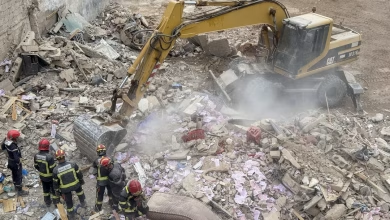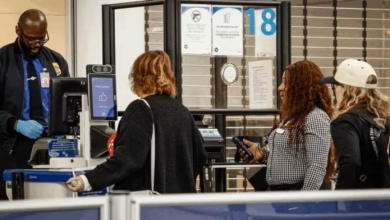Palestinians In Gaza Begin Ramadan With Hunger Worsening

- Palestinians began fasting for Ramadan on Monday as the Muslim holy month arrived with ceasefire talks at a standstill.
- Israel has vowed to expand its offensive to the southern city of Rafah, where half of Gaza’s population has sought refuge.
- US President Joe Biden has said an attack on Rafah would be a “red line” for him, but that Washington would continue to provide military aid to Israel.
Palestinians began fasting for Ramadan on Monday as the Muslim holy month arrived with ceasefire talks at a standstill, hunger worsening across the Gaza Strip and no end in sight to the five-month-old war between Israel and Hamas.
Prayers were held outside amid the rubble of demolished buildings late on Sunday. Some people hung fairy lights and decorations in packed tent camps, and a video from a UN-school-turned-shelter showed children dancing and spraying foam as a man sang through a loudspeaker.
But there was little to celebrate after five months of war that has killed more than 30,000 Palestinians and left much of Gaza in ruins.
Families would ordinarily break the daily fast with holiday feasts, but even where food is available, there is little beyond canned goods and the prices are too high for many.
“You don’t see anyone with joy in their eyes,” said Sabah al-Hendi, who was shopping for food on Sunday in the city of Rafah. “Every family is sad. Every family has a martyr.”
The US, Qatar and Egypt had aimed to broker a ceasefire ahead of the normally joyous month of dawn-to-dusk fasting – with hopes for the release of dozens of Israeli hostages and Palestinian prisoners and the entry of a large amount of humanitarian aid – but the talks stalled last week.
Hamas is demanding guarantees that any agreement will lead to an end to the war, while Israeli Prime Minister Benjamin Netanyahu has vowed to continue the offensive until “total victory” against the militant group and the release of all remaining hostages.
The war began when Hamas-led militants stormed into southern Israel on October 7, killing 1,200 people, mostly civilians, and taking around 250 hostage. Hamas is still believed to be holding around 100 captives and the remains of 30 others after an exchange last year.
The war has driven around 80% of Gaza’s population of 2.3 million people from their homes and pushed hundreds of thousands to the brink of famine. Health officials say at least 20 people, mostly children, have died from malnutrition and dehydration in northern Gaza.
Israeli forces have largely sealed off the north since October, and aid groups say Israeli restrictions, ongoing hostilities and the breakdown of law and order have made it nearly impossible to safely deliver desperately needed food in much of the territory.
Israel has vowed to expand its offensive to the southern city of Rafah, where half of Gaza’s population has sought refuge, without saying where civilians would go to escape the onslaught.
US President Joe Biden has said an attack on Rafah would be a “red line” for him, but that Washington would continue to provide military aid to Israel.
He acknowledged in his annual Ramadan message that the holy month comes “at a moment of intense pain”.
“As Muslims gather around the world over the coming days and weeks to break their fast, the suffering of the Palestinian people will be front of mind for many. It is front of mind for me,” he said.
The US and other countries have begun airdropping aid in recent days, but humanitarian groups say such efforts are costly and insufficient.






